Daniel M. Bensen's Blog, page 8
May 20, 2022
Conodonts 2
(see posts like this a week earlier by signing up to my $1 patreon)
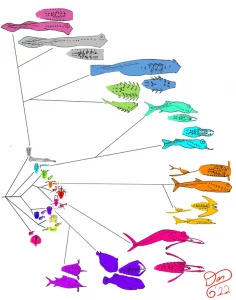
You might remember my first radiation of conodonts last month. Now it’s time for phase two of my art/evolution experiment. With the aid of a dice, I halved the numbers of condont species, leaving only five to radiate into 11 new (and somewhat better drawn) species. These are:
pinkish – eats smaller plankton
gray – eats larger plankton
gray-blue – detritivore, conodont elements protruding through gill slits provide protection
gray-green – bottom-dwelling detritivore, duplicated conodont elements on first four segments
light teal – fast pursuit predator
teal – slow pursuit predator
orange – large pelagic plankton-eater. First conodont elements provide stabilization
light orange – bottom-dwelling crustacean-specialist. First conodont elements provide stabilization and grab prey
magenta – benthic ambush predator
dark purple – specialized bivalve eater
purple – eats small, reef-dwelling invertebrates
I won’t ask you who you want to survive the next extinction event, because that’s going to be random. But what niches do you want to see the survivors evolve to fill next time?
#danielmbensen #art #illustration #speculativeevolution #creatureart #creaturedesign #specbio #conodonts
May 13, 2022
April newsletter: Doing Good
So there we were, giving this stranger 200 leva.
“What? Are you serious?” He wasn’t being sarcastic. He really wanted to check that what he thought was happening was actually happening. His face scrunched up, trying not to cry.
That was when I was finally sure this wasn’t all a scam.
It had started as a quick – and rather unpleasant – walk. The weather had turned mean: chilly and blustery, with bitter little needles of water blowing up into our faces. But Pavlina and I needed a break. We’d gotten this weekend by ourselves in Sofia while the girls stayed with their grandparents in the village. It was supposed to be relaxing, but instead we had nothing to do but work.
At 11, we finally pulled ourselves away from our computers and piles of laundry to just move our legs a bit. We walked quickly, shoulders hunched against the needle rain, talking about I can’t remember what. We swung around the back end of our neighborhood, heading home.
Someone yelled. It was clearly the sound of a person, but inarticulate and raw. Pavlina and I both looked up.
Across the street was a medium-sized apartment building. Three or four men stood around the high little tables of a corner store, but none of them had yelled. Like us, the men were looking at the building’s other corner. This was hollowed out into a square tunnel for cars to drive through on their way to the parking lot behind. In this damp, gray cave stood a couple with a baby in a stroller and three enormous bags.
The baby was crying in high, grinding alarm. The sound sent me back to the time when our baby had cried like that. Thank goodness she was older now.
“Do you think something is wrong?” I asked.
The mother yelled again. She strode to the wall of the tunnel and smacked her arms against it. She did it just like I used to, like I still sometimes do when I lose my grip on my life. Lift at the shoulders, elbows at ninety degrees as if you’re doing a pull-up. Then bring your forearms down on the wall as if it’s the cause of all your frustrations, as if once you smash this barrier, your life will start working properly again.
Pavlina and I cut across the road and approached the couple. “Nuzhda ot pomosht?” I asked. A memorized line. Is there need of help?
“Neshto da Vi pomognem?” asked Pavlina. Is there something we can help you with?
The father told Pavlina that the three of them had been kicked out of or in any case left a homeless shelter. He was calling various emergency numbers. Pavlina tried calling a friend of ours who works for Caritas, but it was 11am on a Sunday and she didn’t answer. The mother picked up the baby and put him back in the stroller. It made no difference. Both of them cried, and the father paced and shushed them as he and Pavlina searched on their phones for other numbers to call.
A man from the cafe at the building’s other corner walked into view. I braced myself for him to start yelling, but no. He had been listening. He suggested other places to call.
Pavlina and I put our heads together. “Can we go buy some chocolate for the baby?” “I didn’t bring my wallet.” “Let’s go home and get it.” “Tell them to stay here.”
We did, and walked fast. I had my own phone out, looking up the hotel in our neighborhood and the prices there. A night for two adults and one child: 170 leva.
“Should we just book it for them?”
“No. They can do whatever they want with the money.”
Pavlina told me where the cash was and I broke into a jog. I was worried that we’d get back there and the family would be gone.
They weren’t gone. Pavlina gave the father an envelope of cash, just the way my students used to pay me. He looked at me, absolutely shocked. “Are you serious?”
“We have children too,” Pavlina explained.
He came in low, arms stretched out, head ducked so as not to meet my eyes and cry. I felt teary and awkward myself. I hugged him back and tried my best to explain where the hotel was and what its name was. Pavlina hugged the mother, who thanked us, crying openly. The baby kept wailing. He was too upset to figure out what to do with the chocolate Pavlina gave him.
We walked home through a tunnel formed by the budding chestnut trees and the metal grate of the fence around a basketball court. The weather was still miserable.
“Should we have led them to the hotel?” I fretted. “Should I have helped them carry their stuff?”
“No,” said Pavlina. “Some big foreign guy carries off your bags? They’d feel obligated to talk to us and do something to thank us.” She made a clean-slate gesture. “No strings attached.”
I imagined the family in their warm hotel room, full of room service food, taking their showers, having their break-downs in safety, and reassembling their lives. Would any of that actually happen? Did I need to know?
“We just help them,” I said.
Doing good can be easy. You know what makes sense for you to do, and you’ve built up a means to do it. You expand your base. You grow your business. Once you put yourself in a position where you have something to give, you notice opportunities to give it.
We went home afterward and had lunch.
To see these posts a week earlier and with pictures, support my work on Patreon for $1.
***
In other news, The project I dragged myself away from that Sunday in April was The Barrayaran Sprachbund. It was supposed to be a fun little linguistic sketch of the languages of Lois McMaster Bujold’s planet of Barrayar, but blew up and took over my life for two weeks. People seemed to like it, though. And I did translate the first sentence of the UN declaration of human rights into four made-up future languages, so there’s that.
I also had a fun conversation with people on the Spec Evo forum about self-editing DNA and the fascinating real-world microbe Deinoccus radiodurans. And, in honor of Easter, I re-posted two fun cooking-themed short stories: “A Piece of Cake” which is about baking a kozunak in space, and “Culinary International: The Rising Agent” which is just as silly as it sounds.
April’s exclusive story for my patrons was “Lords of the World” a short story originally published in Alternate History Magazine about the post-colonial present day a hundred years after H.G.Wells’s War of the Worlds. In Chapter 6 of The World’s Other Side , Bounce got drunk for the first time and made indecent suggestions to John.
On the video front: I gave some thought to things I want to change. The result was a new schedule (every other week rather than once a week) and some more audio editing (so we don’t say “um” so much). The first of these new videos is the first half of a story Paul Venet told to a group of Fulbright volunteers about his experience helping a Somali refugee prepare for her US citizenship exam. Come back to my channel every other Friday for rest of Paul’s story, followed by my nuts-and-bolts run-through of how I teach English online.
This is all in aid of Pavlina and my project with Fulbright Bulgaria teaching English and Bulgarian to Ukrainian Refugees. I had the pleasure of listening in to our very first class just last night. It’s really happening. If you would like to volunteer to be a teacher, sign up here.

***
And some stuff I enjoyed:
Monday Starts on Saturday by Arkady and Boris Strugatsky – A satire of Soviet academia and Russian folklore by people who loved both.
The Strugatsky brothers wrote in the Soviet Union in the 1960s and 70s, but their work still reads to me as fresh and sincere. And dark. Monday Starts on Saturday is about a computer programmer who gets dragooned into working for the government agency that deals with magic and supernatural activities. The book is part of a conversation about where we came from and where we’re headed, all the while playfully satirizing the academic processes that are supposed to take us into the future. Are we really moving closer to the end of human suffering, or this all a hollow shell built by self-interested charlatans? In either case, it’s fun to watch a homunculus try to eat infinite fish-heads.
As for the darkness: read this glossary entry from the back the book: “The Hammer of Witches: a medieval manual on third-degree interrogation. Now obsolete.”
Making Money by Terry Pratchett — my favorite was the mad economist
“Nice to meet you,” says the mad economist, “We’ve done absolutely nothing wrong.” That was my favorite part. Book two of the Moist Von Lipwig sub-series has a good grip on its main characters and a good villain. On this (my third-maybe?) read-through, though, I started to see the seams. I wish the mad economist and the golems were integrated more into Lipwig’s story. And I wanted to see the clown-battle. If you don’t know what I’m talking about, read the book.
The Revelations by Erik Hoel — like running through the woods in a thunderstorm while your philosophy professor yells at you
Too rarely, I read a recent book that gives me hope for the publishing industry. Piranessi was one, The Darkness that Comes Before was another. The Revelations is the third and it reminds me of both. The Revelations is a literary novel rather than scifi, urban fantasy, mystery, romance, or perhaps office drama, but it has elements of all of them. Its main character is lost trying to make sense of the world and himself, perpetually on the edge of nervous breakdown because of the insanely ambitious goal he’s set for himself: solve the Problem of Consciousness. Then there’s sex, murder, conspiracies, and Something Weird Going on. And it’s gorgeously written. Please go read it so we can talk about it.
By the way, if you’re disappointed in the ending, I recommend you read this review, which helped me figure out what the author was talking about.
Hard to be a God by Arkady and Boris Strugatsky — Why you shouldn’t join the peasent revolt, even though you have mad martial arts skills and a helicopter
There has been a whole lot of discussion about contact between advanced and primitive cultures in science fiction, but I don’t think I’ve seen a take on it as honest as this. An anthropologist from Earth documenting the culture of a medieval planet (and playing out his childhood Three Musketeers fantasies) finds himself caught up in something that looks a whole lot like the rise of an oppressive 20th-century-style dictatorship. What the hell is going on? And how to you stand it?
I also got a lot out of the afterword by Boris Strugatsky, which gave me some guidance about how to write around censorship.
Death Game Quality Assurance by Andrew Rowe – aggressively mediocre
I was intrigued by the premise: “what would really happen in Ready Player One.” The story delivered, but only in the narrowest way. Rather than getting the world built only around players of video games, we get the world built only around the QA team. It was interesting learning a little of how Quality Assurance works, but I’m sure there’s more to the video-game industry than that. The characters were bland – I got the impression they were written mostly to meet expectations and not offend. What kept me reading was the bad guy. Both his character and his voice actor’s performance were bold and fun.
Adam Ragusea — he taught me how to make roast potatoes and coq au vin! A low-key, informative, and subtly funny channel.
See you next month
May 4, 2022
First Knife in Spanish
Ya que los amigos de @zona han levantado la liebre*, os dejamos por aquí un pedazo generoso de la cubierta de nuestro próximo lanzamiento en la colección Excelsior: . pic.twitter.com/qkF3BMacr7
— Ediciones Gigamesh (@EGigamesh) May 3, 2022
April 28, 2022
Teaching English story 1
Part 1 of the inspirational story Paul Venet told to the volunteers in our program to teach English to Ukrainian Refugees in Bulgaria. Thank you to the volunteers and Fulbright Bulgaria.
If you would like to volunteer to teach English or Bulgarian to Ukrainian refugees, follow this link.
April 22, 2022
Barryaran Sprachbund 2
(Barrayar is the setting of several of the books in Louis McMaster Bujold’s Vorkosigan Saga, for which she has won a deservedly enormous number of Hugos, Nebulas, and other awards. Go read those books.)
Go read last week’s post (https://buff.ly/37YTeai), which introduced the Barrayaran dialects of French, Russian, English, and Greek, as well as the alphabet used to write them all.
All four of Barrayar’s indigenous dialects have diverged significantly from their Earth standard parent languages (and even more from their Galactic standard cousins), but have converged with each other, forming a “sprachbund” or linguistic area.
Sound changes have brought the languages’ phonologies closer to each other, often obscuring grammatical prefixes and suffixes. For example, the French and English words “comptable” /kɔ̃’tabl/ and “accountant” /əˈkaʊn.tənt/ have on Barrayar shifted to кωнт /kɔnt/ and каунт /kaуnt/ respectively.
Grammatical particles (some innovated) and remaining morphology have tended to parallel each other. For example, 21st century French Tous les êtres humains naissent libres (lit. all the-pl being-pl human-pl they-are-born free-pl) and Russian Все люди рождаются свободными (all human-pl they-are-born free-instrumental-pl) have become Barrayaran French Ту л з люд нэс з лiбр and Barrayaran Russian Фсе д люди рождит свобни, both literally translated as “all the human-pl are-born-pl free-pl.”
Below are example texts from the pre-Galactic-era standards of the parent languages, compared to their Barrayaran daughters.
French (21st-century Paris standard):
Tous les êtres humains naissent libres et égaux en dignité et en droits. Ils sont doués de raison et de conscience et doivent agir les uns envers les autres dans un esprit de fraternité.
/tu lɛ’z‿ɛtʁ y’mɛ̃ nɛs liбʁ e e’ɡo ɑ̃ di.ɲi’te e ɑ̃ dʁwa il’z‿ɔ̃ dwe də ʁɛ’zɔ̃ e də kɔ̃’sjɑ̃s e dwa’vɛ̃ a’ʒiʁ lɛ.z‿œ̃z‿ɑ̃’vɛʁ lɛ’z‿otʁ dɑ̃.z‿œ̃.n‿ɛs’pʁi də fʁa.tɛʁ.ni’te/
(Barrayaran standard)
Ту л з люд нэс з лiбр и з игал н лр дiньити и ж дрwа. Зωн ж дωни резм и севrити и дwав а маrш н пωrтрити а здрзотр н ун спрi т фрэrити.
/ty ɫəʒ‿’ɫjʉd nɛs ʒ‿’ɫji.bəʁ ɪ z‿ɪ’gal ən ɫəʁ ‘dji.njɪ.tɪ ɪ ʒ‿dʁwa z‿ɔn ʒ‿’dɔn.ɪ ‘ʁje.zəm ɪ ‘sjev.rɪ.tɪ ɪ dwav ə marʃ ən ‘pɔrt.ʁɪ.tɪ ə zdəʁ‿’z‿o.təʁ ən yn spʁi t‿’fʁɛ.rɪ.tɪ/
There is some debate about the phonological nature of the schwa sound /ə/ in Barrayaran dialects. It is conventionally not written, and some linguists have argued that it is not pronounced, either. A closer phonetic transcription might use syllabic sonorants instead, where such sounds as /ʒ/ and /ʁ/ form the syllable nucleus.
Russian (21st-century Moscow standard):
Все люди рождаются свободными и равными в своем достоинстве и правах. Они наделены разумом и совестью и должны поступать в отношении друг друга в духе братства.
/fsʲe ˈlʲʉ.dʲɪ rɐʐˈdaj.ʊt͡sə svɐˈbod.nɨ.mi i ˈrav.nɨ.mi f‿svɐˈjɵm dɐˈstoɪn.stvʲe i prɐˈvax ɐˈnʲi nədʲɪˈlʲɵnːɨj ˈraz.ʊm.əm i ˈsovʲ.ɪsʲ.tʲjʊ i dɐɫʐˈnɨ pəs.tʊˈpatʲ v‿ɐt.nɐˈʂɛnʲ.ɪɪ druk ˈdruɡə v‿ˈdu.xʲe ˈbrat͡s.tvə/
(Barrayarn Standard)
Фсе д люди рождит свобни и равни ф свойн цэннсть и т прави. Нi даrинни разум и знайньисть и долж п стюп в носньисть п дрюкдруг в дьин спрi м братисть.
/fsje d‿’ɫjʉ.dɪ ‘ʁоʒ.dɪt ‘svob.nɪ ɪ ˈʁav.nɪ f‿’svojn ˈt͡sɛn.nəstj ɪ t‿p’ʁavɪ nji ‘da.rɪn.nɪ ˈʁaz.ym ɪ ˈznaj.njɪstj ɪ ‘dolʒ pə stjʉp v‿’nos,njɪstj pə ‘dʁjuk‿dʁyɡ v‿dɪn spʁi m‿ˈbʁat.ɪstj/
As with other Barrayarn dialects, Barrayaran Russian marks stress primarily with pronunciation of the vowel. U can be realized as stressed /jʉ/ and unstressed /y/ for example.
English (21st-century London standard):
All human beings are born free and equal in dignity and rights. They are endowed with reason and conscience and should act towards one another in a spirit of brotherhood.
/ɔːl ˈçju̟ː.mən ˈbiː.ɪŋz ɑː bɔːn fɹiː ɛn ˈiː.kwəl ɪn ˈdɪɡ.nɪ.ti ɛn ɹɑɪts ðeɪ ɑː ɪnˈdaʊd wɪð ˈɹiː’zən ɛn ˈkɒn.ʃəns ɛn ʃəd ækt təˈwɔːdz wʌn əˈnʌð.ə‿ɹ.ɪn ə ˈspɪ.ɹɪt ɒv ˈbɹʌðə.hʊd/
(Barrayaran)
Ωл δ людз рбωrн фрiз н iquлз ин δир wωrδинис н райц. Δей гiвинз рiзн н ноwингнис н шюд цтеп ин кеrингнис т iчδр ин wн спрi в браδринис.
/ɔɫ ð‿ˈɫjʉdz zbɔrn fʁjiz ən ˈjik.wəɫz ɪn ðɪʁ ˈwɔr.ðɪ.nɪs ən ʁajt͡s ðjej ‘giv.ɪnz ˈʁji.zən ən ˈnо.wɪŋ.nɪs ən ʃjʉd t‿stjep ɪn ‘kje.rɪŋ.nɪs t‿’jitʃ.ðəʁ ɪn wən spʁji v‿ˈbʁa.ðʁɪ.nɪs/
Barrayaran English shows how much vocabulary was lost and re-developed by means of derivational morphology or borrowing from other dialects. “Human” (whose meaning has shifted to “not mutant”) has been replaced by Russian “lyud” and words such as “dignity” “conscience” and “brotherhood” have been replaced by “worthy-ness,” “knowing-ness” and “brother-y-ness”
Greek (21st-century Athens standard):
Όλοι οι άνθρωποι γεννιούνται ελεύθεροι και ίσοι στην αξιοπρέπεια και τα δικαιώματα. Είναι προικισμένοι με λογική και συνείδηση, και οφείλουν να συμπεριφέρονται μεταξύ τους με πνεύμα αδελφοσύνης.
/ˈo.li ˈan.θro.pi ʝeˈna.un.te eˈlef.θe.ɾi ke ˈi.si stin ak.si.o.preˈpia ke ta ðiˈce.o.ma ˈi.ne pri.cisˈme.ni me lo.ʝiˈci ke siˈni.ði.sis ke oˈfi.lun na sim.be.ɾiˈfe.ɾon.te me.takˈsi tus me ˈpnev.ma a.ðel.fo‘sin.is
Ол т æндрпи енут еλифθри ки iзи ис ту ξпрэпит ки т δiци. Iн δiнини лойц ки ξеrнит ки т фiλ н вæд ис феrнит н каθиλ ис ин пнгевм н т δеλфит.
/ˈoɫ tə ˈjæn.dʁəp.ɪ ‘je.nyt ‘je.lɪf.θəʁ.ɪ kɪ ˈjiz.ɪ ɪs‿ty ksə’pʁɛ.pɪt kɪ tə ‘ðji.t͡sɪ ˈji.n ‘ðji.nɪ.nɪ ‘ɫojt͡s kɪ ksjer.nɪt kɪ tə ˈfjil nə ‘vjæd ɪs ‘fjer.nɪt nə ‘ka.θɪl ɪs ɪn ˈpngjev.əm nə ðjel.fɪt/
Greek has changed a great deal under the influence of the other three dialects, but is now influencing them. Many current fashions of speech in Vorbar Sultana (e.g. using “t” instead of “the” in English) are Greek in origin.
For those who wish to know more, there follows a key to the above language samples:
Ту/Фсе/ωл/ол = all
л/т/δ/т = the (Russian д before л)
люд/люд/люд/æндрп = a person (юм = human (not mutant))
з-/-и/-з/-и = plural marker (French ж- before д)(English -ц after t)
нэ/рожд/бωрн/ену = to be born (нэс/рождюц/рбωрн/енут = they are born)
-с/-ит/р-/-т = plural present imperfective verb (are doing/do)
лiбр/свобн/фрi/еλифθр = free
и/и/н/ки = and
игал/равн/iquл/iз = equal
н/в/ин/ис = in (Russian ф- before c)
лр/свойн/δир/ту = their
дiнь/цэн/wωrδ/ξпрэп = worth, value (дiньити/цэннсть/wωrδинис/ξпрэпит = worthiness, dignity)
-и/-н/-и/-и = adjective from noun (noun-y)
-ти/-сть/-нис/-т = abstract noun from adjective (nouny-ness)
дрwа/прав/райт/δiц = a right
Зωн/Нi/Δей/Iн = they
0 = am/is/are (not used)
дωн/даr/гiв/δiн = to give (ж дωни/даrинни/гiвинз/δiнини = they are given)
-и/-инн/-ин/-н = passive participle (-ed)
резм/разум/рiзн/лойц = reason
сe/знай/ноw/ξеr = to know (севrити/знайньисть/ноwингнис/ξеrнит = knowing-ness, consciousness, conscience)
-р/-(и)нь/-инг/-н = noun from verb (French -(в)р for this verb)
дwав/долж/шюд/фiλ = should/must
а/п/т/н = to (English ц before с)
маrш/стюп/степ/вæд = to step
пωrт/нос/кеr/феr = to carry (пωrтрити/носньисть/кеrингнис/феrнит = reference, attitude, position)
здрзотр/дрюкдrур/iчδр/каθиλ = each other
ун/дин/wн/ин = indefinite article (a)(юн/дiн/wан/ен = one)
спрi/спрi/спрi/пнгевм = spirit (дюх = ghost/soul, спirит = hard alcohol)
т/н/в/н = of (Russian м before б)
фрэr/брат/браδр/δеλф = brother (фрэrити/братист/браδринис/δеλфит = brotherhood)
April 19, 2022
The Barrayaran Sprachbund 1
(this post appeared seven days earlier on my patreon)
(Barrayar is the setting of several of the books in Louis McMaster Bujold’s Vorkosigan Saga, for which she has won a deservedly enormous number of Hugos, Nebulas, and other awards. Go read those books.)
And now, the in-world voice. Ahem.
Barrayar is a life-bearing exoplanet, colonized through naturally-occurring wormholes in the 23rd century. Soon after initial colonization began, however, the wormhole linking Barrayar to Earth closed, leaving the exoplanet isolated until a new route was discovered. By that time, civilization on Barrayar had stabilized as a continent-spanning pre-industrial empire, speaking four languages:
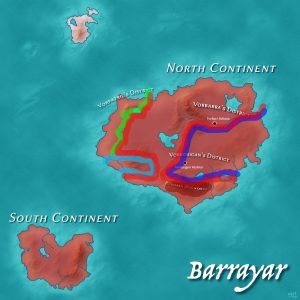
Barrayaran French (green)
Plains Russian (red)
English (dark blue)
Greek (outlined in light blue)
Hill Russian (dark red)
All four languages are written in the Barrayaran Cyrillic Alphabet.
а /a/ as in “father”
б /b/ as in “bat”
в /v/ as in “very”
г /g/ as in “good”
д /d/ as in “dog”
е /je/ approx. as in “yen”
ё /jo/ as in “yoh”
ж /ʒ/ as in “measure”
з /z/ as in “zoo”
і /i/ as in “three”
и /ɪ/ as in “thin”
й /j/ after vowels as in “buy”
ј /dʒ/ as in jungle
к /k/ as in kitten
л /ɫ/ as in able
λ /l/ as in bill
м /m/ as in man
н /n/ as in none
о /o/ as in only
п /p/ as in pan
р /ʁ/ as in French rouge (“warm”)
r /r/ as in Russian ruble (“cold” or “rolled”)
с /s/ as in star
т /t/ as in tell
у /y/ approx. as in few
ф /f/ as in fair
х /x/ as in Scottish loch
ц /t͡s/ as in bits
ч /tʃ/ as in cheese
ш /ʃ/ as in sherry
ψ /ps/ as in tops
s /dz/ as in pads
δ /ð/ as in these
θ /θ/ as in thin
qu /kw/ as in quiet
w /w/ as in win
ξ /ks/ as in ox
ы /ɨ/ approx as in “uh-ih”
ь /j/ after consonants as in bright yellow
œ /jœ/ as in french sœur with added y
э /ɛ/ as in eggs
α /ɑ/ as in sock
ю /ju/ as in you
я /ja/ as in “yah”
æ /jæ/ as in “yeah”
ω /ɔ/ as in thought
Here are some examples:
Barrayar = Баrаяр /’ba.rə.jar/ (standard) /’bæ.rа.jar/ (Dendarii)
Gregor Vorbarra = Грэгр Ворбаrа /’gʁɛ.gəʁ voʁ’ba.rə/
Vorbarr Sultana = Ворбаr Султана /voʁ’bar syl’ta.nə/
The origin of the “barr” element has been lost in time (the proposal that is derives from English “bar” has been hotly rejected). The double r in the Latin transliteration indicates a rolled or trilled r, as opposed to the more usual “warm” or “guttural” r. R in Barrayaran languages is “warm” by default, but becomes trilled when following a stressed vowel.
As a proper name, Баrа is spelled and pronounced conservatively, preserving the final ə.
Miles Naismith Vorkosigan = Майλз Нэйсмиθ Воркосигн /majlz ‘nɛjs.mɪθ voʁ’ko.sɪ.gən/
Vorkosigan Surleau = Воркосигн Сурло /voʁ’ko.sɪ.gən syʁ’ɫo/ (Dendarii)
Vorkosigan Vashnoi = Воркосигн Вашной /voʁ’ko.sɪ.gən ‘væsh.noj/ (Dendarii)
Dendarii Mountains = Дэндаrий Маунтнз /dɛn’da.rij ‘maʊn.tənz/ (Dendarii)
The origin of “Vor” is also debated, though it should be noted that Russian вор means “thief.” By normal sound change rules, the honorific prefix should be reduced to вр, but because the Vor- name system is a fairly recent development, the prefix retains its vowel.
Vorkosigan Surleau and Vorkosigan Vashnoi are both locations in the Dendarii Mountains in the continent’s south. The dialects of English and Russian there are conservative, and have not participated in the palatal-reanalysis and vowel reduction of the standard dialects. Vashnoi in Dendarii Hill Russian means “yours.”
Ivan Xav Vorpatril = İвн Ξав Ворпатриλ /’i.vən ksav voʁ’pat.ʁɪl/ (standard)
Ekaterin Nile Vorvayne Vorsoisson Vorkosigan = Екатирин Найλ Ворвэйн Ворсwасн /ɪ’kat.ɪʁ.ɪn najl voʁ’vɛjn voʁ’swas.ən/
Personal names from the French-speaking northwest sometimes preserve conservative spellings. Phonetically, Екатирин would be *Икатирин, to show that the second syllable is stressed, rather than the first. Only an uneducated prole would make such a mistake, however.
Tune in next week for some Barrayaran grammar and vocabulary.
April 18, 2022
Bulgarian and English classes for Ukrainian refugees
Mejduchasie and Fulbright Bulgaria are organizing free Bulgarian and English for Ukrainian refugees.
If you would like to sign up for lessons, here is the link:
http://mejduchasie.com/for-ukrainian-refugees-en/
Separate lessons for adults and children
Lessons will be virtual – you can participate from anywhere.
Lessons will begin in early May.
If you know someone who needs these lessons, please share this message with them. If you want to teach English or Bulgarian or help out in some other way, please contact me.
Thank you
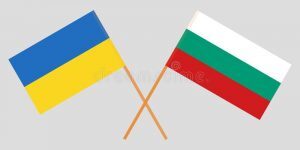
Mejduchasie and Fulbright Bulgaria are organizing free Bu...
Mejduchasie and Fulbright Bulgaria are organizing free Bulgarian and English for Ukrainian refugees.
If you would like to sign up for lessons, here is the link:
http://mejduchasie.com/for-ukrainian-refugees-en/
Separate lessons for adults and children
Lessons will be virtual – you can participate from anywhere.
Lessons will begin in early May.
If you know someone who needs these lessons, please share this message with them. If you want to teach English or Bulgarian or help out in some other way, please contact me.
Thank you

April 1, 2022
Conodonts
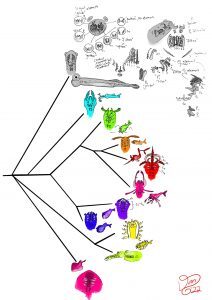
(see posts like this on my Patreon one week earlier)
Partly this came from a conversation we’ve been having at the Spec Evo forum, and partly from some musings I’ve been having on the random aspects of evolution. More on randomness next time. For now, I give you a delicious array of conodonts.
Conodonts were jawless fishes that lived until about 200 million years ago. They used comb-like teeth of hydroxyapatite (the major component of both teeth and bones) to filter plankton out of water, and perhaps to grab, slice, or crush prey as well. Above, you see how I squashed conodonts into different niches first, and then I figured out what their evolutionary relationships might be.
Starting at the top we have:
Gray: ancestral filter-feeder similar to real fossil conodonts
Teal: pelagic pursuit-predator
Green: bottom-feeder
Orange: large, cruising filter-feeder
Red: pelagic apex predator, feeding on small vertebrates
Violet: benthic ambush-predator
Indigo: large shell-fish specialist
Blue: small shell-fish specialist
Yellow: small invertebrate-feeder, uses conodont elements on evertile tissue for defense
Chartreuse: small invertebrate-feeder, uses evertile tissue for prey-capture
Violet2: benthic shell-fish specialist
Tune in next time, for my next step. Which clade do you hope will have the most babies?
March 25, 2022
Tottering Horrors
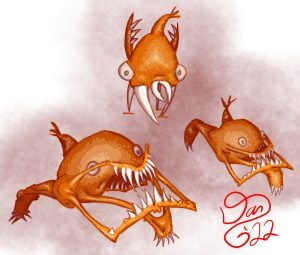
(see posts like this a week earlier on my Patreon)
Experiments with an idea that never made it into Interchange. Imagine a fish that gets onto land, not by pushing on the ground with its fins, but by using its jaws. Remember that fish have (potentially) several sets of jaws nested one within the other, all evolved from the repeating structure of the gill arches.
In the topmost picture, the lower jaws are divided at the “chin” and folded back into comb-shaped display structures. The other limbs (and feeding mandibles) are individual teeth. I wasn’t satisfied with that, but the result was cute.
The lower picture was better. The front and rear legs evolved from the second-outermost jaw of the aquatic ancestor. The outermost jaws are still used to catch prey, which is passed to the inner-most jaws, which are finally connected to the esophagus. The little hat thing on top is the tail, which has evolved into an excretory and display structure.
Sweet dreams!



